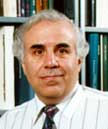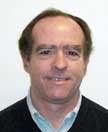Ingraffea, Guckenheimer strengthen Theory Center management team


Two leading members of Cornell University's engineering and mathematics faculty have been named to top positions in information science and technology at the university.
Tony Ingraffea, the Dwight C. Baum Professor of Engineering and associate director of Cornell Theory Center (CTC), has been appointed acting director of CTC, effective Sept. 6. He will serve until a new director is selected in a national search being led by computer science Professor Charles Van Loan, the J.C. Ford Professor of Engineering and chair of the Department of Computer Science. John Guckenheimer, professor of mathematics, has been appointed associate dean of the Faculty of Computing and Information Science (CIS), effective Aug. 1, with a primary responsibility to oversee CTC.
"We are delighted to announce that Tony Ingraffea has agreed to serve as the acting director of the Theory Center," said Robert L. Constable, dean of CIS. "With Tony's appointment to this position and John Guckenheimer's appointment as associate dean of computational science and engineering, we have strengthened CTC's management team, charged with broadening its mission and integrating its activities with CIS research and teaching missions."
CIS embraces not only the Theory Center and the Department of Computer Science, but also a network of faculty throughout the university applying computing technology to disciplines ranging from particle physics to textile design.
Ingraffea has taught structural mechanics, finite element methods and fracture mechanics at Cornell since 1977. His research concentrates on computer simulation and physical testing of complex fracturing processes.
"The Theory Center has enabled much of my research," Ingraffea said. "My association with CTC, as a user and an as an associate director, has provided an opportunity to make the most of information technology in my research and to push the limits of this technology for future discovery. As the acting director, I look forward to leveraging my experience to benefit all members of the Cornell community."
Guckenheimer, who rows with the Cascadilla Boat Club, has been at Cornell for 20 years and holds a joint faculty appointment in Cornell's departments of Mathematics and of Theoretical and Applied Mechanics. He has a long history with CTC. From 1991 to 1996, he was the director of research programs at CTC and was one of the center's first users. In addition, he has served the Society for Industrial and Applied Mathematics in a number of capacities, including president (1997-98) and chair of activity groups in both life sciences and dynamical systems. He currently directs the National Science Foundation-sponsored Cornell Integrative Graduate Education and Research Traineeship Program in Nonlinear Systems.
Guckenheimer earned his bachelor's degree at Harvard and his Ph.D. at the University of California-Berkeley. Before coming to Cornell, he was a faculty member at the University of California, Santa Cruz, and held postdoctoral and visiting positions at institutions around the world, including the Massachusetts Institute of Technology, Université de Nice, the Institut des Hautes Études Scientifiques, the Institute for Advanced Study, Canterbury University in New Zealand and Courant Institute at New York University.
"CIS is very fortunate that John has agreed to serve as associate dean," said Constable. "He is a distinguished mathematician with a great deal of experience in the area of computational science and engineering, both as a past associate director of CTC, director of the Center for Applied Mathematics and past president of the Society for Industrial and Applied Mathematics."
In accepting the position, Guckenheimer cited a recent report from the President's Information Technology Advisory Committee noting that "advances in computing and connectivity make it possible to develop computational models and capture and analyze unprecedented amounts of experimental and observational data to address problems previously deemed intractable or beyond imagination."
"The report … indicates that [the United States] needs to train many more people in computational science and engineering with multifaceted skills," said Guckenheimer. "Cornell takes this assessment seriously and is in a position to provide the necessary leadership to organize more extensive programs designed to prepare people with the insights necessary to strategically move computational science and engineering forward. Computational science is now indispensable to the solution of complex problems in every sector, from traditional science and engineering domains to the key areas of national security, public health and economic innovation."
Media Contact
Get Cornell news delivered right to your inbox.
Subscribe